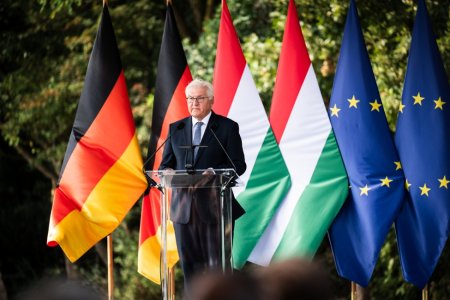35th Anniversary of the Pan-European Picnic
Federal President Frank-Walter Steinmeier delivered a speech on the occasion of 35th anniversary of the Pan-European Picnic which took place in 1989 on the Austrian-Hungarian border
August 20th, 2024What a beautiful summer’s day this is! A perfect day for a picnic outdoors, surrounded by friends and family. Spreading out blankets on the lawn, listening to music, playing cards, enjoying tasty morsels, spending a carefree and happy time together. Everyone brings something with them.
So what are we waiting for? You can just picture the scene, what it looked like here when people were invited to the Pan-European Picnic, with flyers bearing handwritten directions promising hot and cold food on site. What it sounded like here, cheerful and lively, like a traditional dance house. What it smelt like here, like bacon and camp fires and goulash of all kinds. Everything you needed for a picnic was there.
But the visitors attending the picnic from the GDR, who were enjoying their summer holidays in Hungary with their families, brought two more things with them: their passports. And all their courage.
There’s a saying in Hungarian: Sok kicsi sokra megy. Literally translated, it means "many small things add up to a lot", or as we might say in English: "constant dropping wears away a stone". What began here in Debrecen and in Sopron was something of a catalyst for what happened next – right up until the fall of the Iron Curtain 35 years ago. A picnic on a summer’s day turned into the largest mass exodus from the GDR since the Wall was built. The Pan-European Picnic was the first crack in the Berlin Wall. Barely three months later, it had fallen.
There were two reasons why German unity was to take a decisive step forward in Hungary of all places:
Germans from East and West loved their holidays in Hungary! Family reunions between Germans from both sides of the inner-German border took place here each summer from the mid-1960s onwards. Quite understandably so, since, for the citizens in the GDR, the Alster in Hamburg was further away than Lake Balaton. What is more, it was also particularly beautiful here.
A travel guide from 1988 put it thus: Each and every evening, Germans from East and West fraternise and play Doppelkopf. […] Hungary – a meeting point, transit country, bridge between East and West. The country plays host to thousands of disorderly encounters in a world that is otherwise so neatly divided into camps and cultures. You could say that, in Hungary, Germans from East and West were reunited – under the grimly watchful eye of the Stasi at times – throughout the summer – via their shared love for the land of thermal baths, sun-ripened tomatoes and Hungarian wine.
The second reason is the Hungarians themselves. What began here on the border with Austria went hand in hand with Hungary’s societal upheavals. Hungary opened up to the West, joined the IMF and the World Bank, later on also the Geneva Refugee Convention, and as early as January 1988, Hungarians were able to travel freely thanks to "world passports". The Hungarians’ quest for freedom and democracy electrified the entire continent. It made the country a driver of reform, a pioneer of change. And it made Hungarians themselves supporters of people who wanted to flee the GDR. In the weeks that followed the Pan-European Picnic, thousands embarked on the journey to freedom via Hungary. From here, Hungary opened a window to the entire world. This is something that we will never forget. And we continue to be grateful to the Hungarian people for this.
The Pan-European Picnic, along with the singing human chain in the Baltic region and the Monday demonstrations in Leipzig, number among the pivotal freedom movements of the year 1989. Without Hungary, without the irrepressible, indomitable thirst for freedom of the people of Central and Eastern Europe, without their resistance to heteronomy and subjugation, German unity would have been inconceivable. We owe this unity also to the Hungarian people’s love of freedom and their passion for Europe. We need this passion for Europe also today.
Sopron is a symbol of European solidarity, of freedom and unity. Of self-determination as opposed to isolationism. These values unite us Europeans. Hungary has been a member of the European Union since 2004. More than 83 percent of the people here voted to join the EU. And also 20 years later, almost as many Hungarians say that they feel that they are citizens of the European Union.
I hope that we – Hungarians and Germans alike – will take this anniversary of Sopron as an opportunity to reflect once again on our common European purpose. I firmly believe that Hungarians and Germans need each other and that we need the European Union. We developed the EU together and we want to shape its future together – as partners and as friends in the spirit of Sopron: with courage, underpinned by solidarity, freedom and unity.


